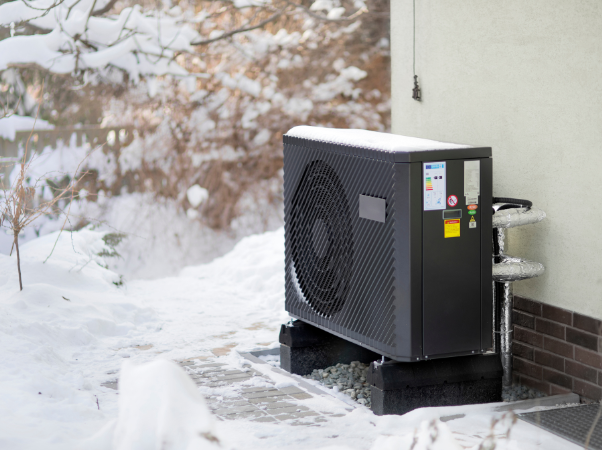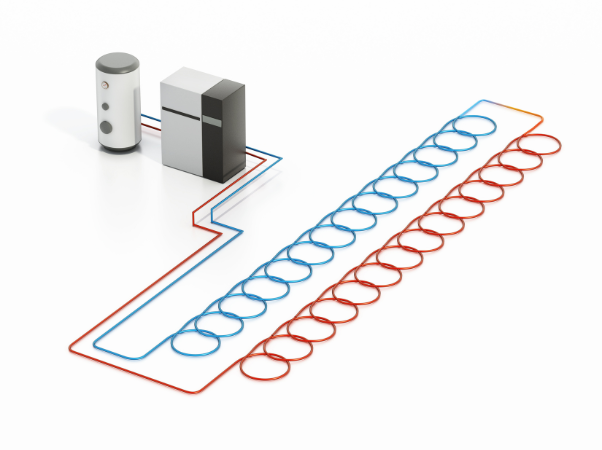Ground Source Heat Pumps Homeowner Guide
Ground source heat pumps are an advanced alternative to traditional heating systems. They can:
- Efficiently heat your household, as well as your water
- Provide a modern household heating system with low noise levels, low maintenance requirements, and low monthly running costs
- Reduce your carbon footprint

How do Ground Source Heat Pumps work?
Ground source heat pumps utilise heat from the ground via pipes that run along trenches, or down deep boreholes. This heat fuels a refrigeration cycle, which allows the heat pump to effectively transfer heat into your property.
Thermal transfer fluid (a mixture of antifreeze and water) flows through a loop of pipe buried underground - usually under a garden or other outdoor spaces. Natural heat from the ground is absorbed into the fluid, which fuels the refrigeration process in the heat pump. This then raises the temperature of the refrigerant and transfers that heat to the property through a heat exchanger.

How Much Money Will a Ground Source Heat Pump Save?
Naturally, the amount of money you can save with a ground source heat pump depends on the effectiveness of your heat pump, and the efficiency of your property.
The Energy Saving Trust estimates that a ground source heat pump can save the following amount per year on a well-insulated, four bedroom property (note that as energy prices and tariff rates change, so will estimated costs and savings):
Source (January 2025): energy saving trust.
- £550 per year compared to an older gas boiler
- £90 per year compared to a new, A rated gas boiler
- £2500 per year compared to old electric storage heaters
- £1200 per year compared to new electric storage heaters
- £1100 per year compared to an old LPG boiler
- £500 per year compared to a new, A rated LPG boiler
- £600 per year compared to an old oil boiler
- £1300 per year compared to coal heating systems
Can I Install a Ground Source Heat Pump?
Unlike air source heat pumps, ground source heat pumps aren’t suitable for some properties.
Here’s some important information to keep in mind when considering a ground source heat pump system for your home:
1. Do you have outdoor space?
Ground source heat pumps don’t need a huge space, but they do require an outdoor area in order to lay the pipes that gather heat from the ground. This means that flats and properties with smaller gardens are generally better suited to air source heat pumps.
There are two methods of gathering heat from the ground - ground loops, and boreholes.
- Ground loop - Ground loop systems are most commonly used to gather heat from the earth. This method will require a fairly large area of land for the loops, which are laid in trenches. The ground conditions must also be considered.
- Boreholes - When horizontal space is limited, deep boreholes can be drilled to gather heat vertically. This tends to be more expensive than ground loop systems, as a thermogeological survey will have to be conducted beforehand and specialist equipment will be required to dig deeper.
Larger houses usually require more than one borehole to gather enough heat from the ground. Boreholes vary in depth between 50-200 metres, depending on the heat demand of the property.
2. Do you have indoor space?
Ground source heat pumps require an indoor heat pump unit, which contains the key components for transforming warmth from the earth into effective, usable heat.
These units often contain a hot water cylinder, so they can take up quite a lot of space. Smaller properties may find themselves better off with more space-saving alternatives.
3. How do you heat your home?
In order for existing radiators or underfloor heating systems to be compatible with a ground source heat pump, they need to be running on a ‘wet system’ - meaning they heat rooms via circulating hot water.
Ground source heat pumps are highly optimised for wet systems, and provide outstanding heating efficiency when installed and set up correctly.
On the flip side, electric underfloor heating systems and electric radiators are incompatible with ground source heat pumps.
Designing the Perfect Heat Pump System
The initial design and planning stages of a ground source heat pump system can be the difference between an ultra-efficient renewable system, and one that struggles to keep up with household demand.
The Energy Efficiency team at City Plumbing have an unrivalled knowledge of ground source heat pumps and other renewable technologies. With years of knowledge and a wealth of project experience under our belt, we can quickly identify the best renewable solution for any type of property - by taking into account age, space, heat loss, emitters, and much more.

Our Stock
Energy Efficiency at City Plumbing leads the way when it comes to efficient, renewable heating systems. We stock a vast range of air source heat pumps from leading suppliers, including Vaullant, Warmflow, and more.



